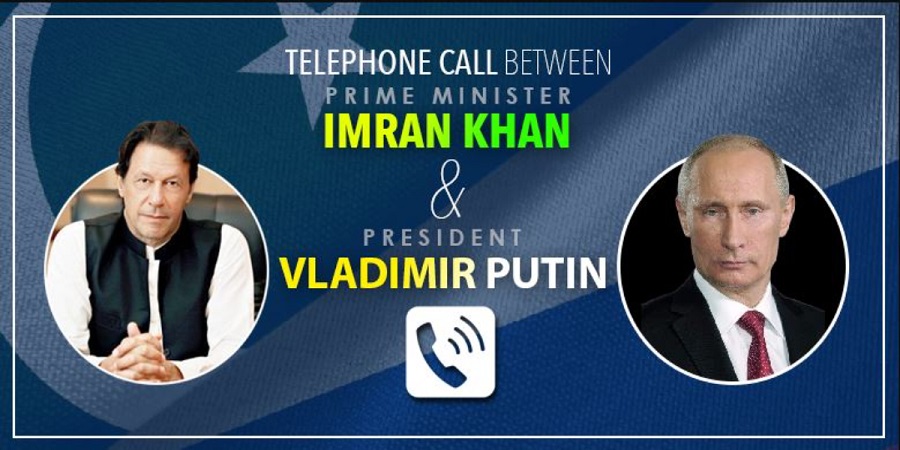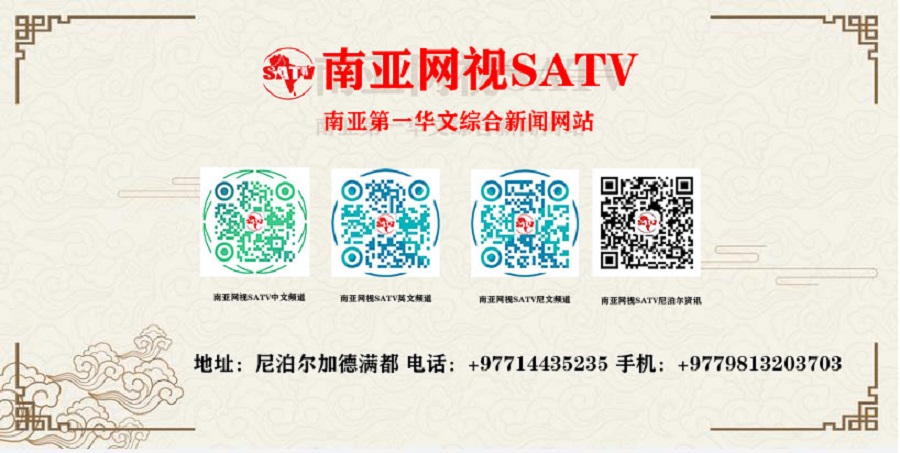
Russian President Vladimir Putin phoned Prime Minister Imran Khan and his Chinese counterpart Xi Jinping on Wednesday and discussed efforts to counter threats emanating from Afghanistan and setting up of an inclusive government there.
In a phone call, the two leaders "expressed their readiness to step up efforts to combat threats of terrorism and drug trafficking coming from the territory of Afghanistan," the Kremlin said in a statement.
They also spoke of the "importance of establishing peace" in Afghanistan and "preventing the spread of instability to adjacent regions". According to international media reports, Putin and Xi "agreed to intensify bilateral contacts" and "make the most of the potential" of the Shanghai Cooperation Organisation (SCO) that is due to convene for a summit in Tajikistan next month.
Several ex-Soviet republics in Central Asia -- where Moscow holds military bases -- share a border both with Afghanistan and China. While Moscow has been cautiously optimistic about the new leadership in Kabul, Putin has warned of Afghan militants entering neighbouring countries as refugees.
Putin has also criticised the involvement of outside powers in Afghanistan’s domestic affairs and said Moscow had "learnt lessons" from the Soviet Union’s decade-long invasion of the country. For its part, after the Taliban swept to power on August 15, China said it is ready to deepen "friendly and cooperative relations" with Afghanistan.
In the conversation, Xi said since the beginning of this year, China and Russia have taken the celebration of the 20th anniversary of the signing of the China-Russia Treaty of Good-neighbourliness and Friendly Cooperation as a new starting point to promote strategic coordination and comprehensive practical cooperation between the two countries. The series of new achievements in this regard provide significant support for the development of both countries and play a pivotal role in uniting the international community to overcome difficulties, he said.
“The two countries should explore new ways of cooperation, expand cooperation areas and work to achieve more cooperation results,” Xi said. Currently, the COVID-19 pandemic waves ebb and flow, presenting the international community an arduous anti-pandemic task, Xi said, noting that China is ready to work with Russia to deepen cooperation on vaccine development and production and ensure the safety and stability of the global supply chain for vaccines, so as to protect the lives and health of the two peoples and contribute to the building of a community of common health for mankind.
“Only the wearer knows whether the shoes fit or not,” Xi stressed, saying that it is the people of the two countries who have the most say about which system works in their own country. “As comprehensive strategic partners of coordination for a new era, China and Russia should deepen cooperation against interference and firmly hold their respective national future in their own hands,” Xi said.
He said China firmly supports Russia in pursuing a development path that suits its national conditions, and firmly supports Russia's measures to safeguard its national sovereignty and security.
Xi stressed that China respects the sovereignty, independence and territorial integrity of Afghanistan and adheres to the policy of non-interference in its internal affairs, and has played a constructive role in resolving the Afghanistan issue via political means. He said that China stands ready to strengthen communication and coordination with Russia and the broader international community to encourage all factions in Afghanistan to build an open and inclusive political structure through consultation, implement moderate and prudent domestic and foreign policies, thoroughly dissociate from all terrorist groups, and maintain friendly relations with the rest of the world, especially neighbouring countries.
For his part, Putin said the Russian side is satisfied with the development of Russia-China relations. He recalled that 76 years ago, Russia and China made tremendous national sacrifices for and decisive contributions to the victory of the World Anti-Fascist War. Under the current circumstances, Putin added, the two sides should intensify strategic coordination, firmly support each other, safeguard the victory of World War II and defend historical truth.
He said Russia firmly adheres to the one-China policy, unswervingly supports China's legitimate positions of safeguarding its core interests on issues related to Taiwan, Hong Kong, Xinjiang and the South China Sea, and resolutely opposes any external force interfering in China's internal affairs.
Russia, he added, is opposed to the politicisation of COVID-19 origins tracing, and hopes to work with China to continuously deepen practical cooperation in various fields and strengthen collaboration against the pandemic.
Noting that Russia and China share similar positions and common interests on the Afghanistan issue, Putin said his country is willing to work with China to intensify communication and coordination, actively participate in relevant multilateral mechanisms, and push for a smooth transition of the situation in Afghanistan.
He also called for concerted efforts to fight against terrorism, cut off drug smuggling, prevent spillover of security risks arising from Afghanistan, resist intervention and disruption by external forces, and safeguard regional security and stability.
The two sides agreed that given the complex and evolving international and regional situation, it is very important and necessary for China and Russia to maintain timely communication on major bilateral and multilateral issues.
They also agreed to maintaining close contact in various ways. Prime Minister Imran Khan also received a telephone call from Vladimir Putin and the two leaders exchanged views on the evolving situation in Afghanistan and bilateral relations.
The prime minister stressed that a peaceful, secure and stable Afghanistan was vitally important for Pakistan and regional stability. Besides ensuring safety, security and protection of rights of Afghans, an inclusive political settlement was the best way forward.
The prime minister underscored that the international community must stay positively engaged in support of the people of Afghanistan, to help address humanitarian needs and ensure economic sustenance. He underscored the importance of coordinated approaches in addressing the evolving situation and noted that Pakistan attached high importance of the role of the Troika Plus format. He expressed satisfaction at the upward trajectory of Pakistan-Russia relations, with increased high-level exchanges and growing cooperation in diverse fields.
The prime minister reiterated the government’s resolve to strengthen trade relations as well as bilateral collaboration in energy sector, including early realisation of the Pakistan Stream Gas Pipeline Project. The two leaders agreed to closely cooperate within the SCO for promoting regional peace and security.
The prime minister reiterated his invitation to President Putin to visit Pakistan. Meanwhile, the leader of a resistance movement to the Taliban has vowed to never surrender but is open to negotiations with the new rulers of Afghanistan, according to an interview with international media.
Ahmad Massoud, the son of legendary Afghan rebel commander Ahmad Shah Massoud, has retreated to his native Panjshir valley north of Kabul along with former vice-president Amrullah Saleh.
"I would prefer to die than to surrender," Massoud told French philosopher Bernard-Henri Levy in his first interview since the Taliban took over Kabul. "I'm the son of Ahmad Shah Massoud. Surrender is not a word in my vocabulary."
Massoud claimed that "thousands" of men were joining his National Resistance Front in Panjshir valley, which was never captured by invading Soviet forces in 1979 or the Taliban during their first period in power from 1996-2001.
He renewed his appeal for support from foreign leaders, including French President Emmanuel Macron, and expressed bitterness at being refused weapons shortly before the fall of Kabul earlier this month.
"I cannot forget the historic mistake made by those I was asking for weapons just eight days ago in Kabul," Massoud said, according to a transcript of the interview published in French. "They refused. And these weapons — artillery, helicopters, American-made tanks — are today in the hands of the Taliban," he said.
Massoud added that he was open to talking to the Taliban and he laid out the outlines of a possible agreement. "We can talk. In all wars, there are talks. And my father always spoke with his enemies," he said.
"Let's imagine that the Taliban agreed to respect the rights of women, of minorities, democracy, the principles of an open society," he added. "Why not try to explain that these principals would benefit all Afghans, including them?
Meanwhile, the US Secretary of State Tony Blinken said the Taliban have made a commitment to allow American citizens and at-risk Afghans to leave the country after 31 August evacuation deadline. He stressed that US efforts to help people who wanted to leave would not end on that date.The secretary of state said that up to 1,000 US nationals - possibly more - could still be in Afghanistan and the administration was making exhaustive efforts to trace them.
Germany´s ambassador to Afghanistan said Wednesday the Taliban will continue to allow Afghans who have the right documents to leave Afghanistan after the United States´ withdrawal deadline on August 31.
Markus Potzel said on Twitter he had met with Taliban deputy chief negotiator Sher Mohammad Abbas Stanikzai, who had "assured me that Afghans with legal documents will continue to have the opportunity to travel on commercial flights after 31 August".



